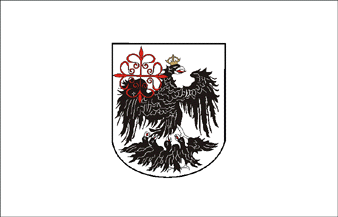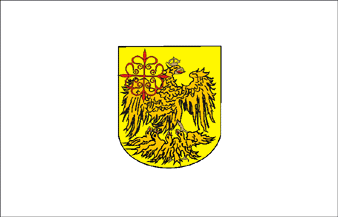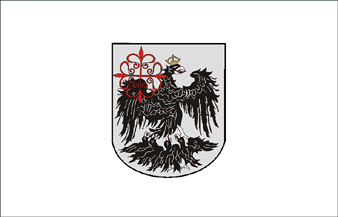
Last modified: 2006-08-19 by francisco gregoric
Keywords: buenos aires | ciudad autónoma de buenos aires | garay (juan de) | cross: calatrava | eaglet | eagle (black) | coat of arms |
Links: FOTW homepage |
search |
disclaimer and copyright |
write us |
mirrors

The Council of the City of Buenos has just approved a new flag for
this city, the capital of Argentina. In fact, the flag was originally
designed by the Spanish founder, Don Juan de Garay. It quite
an attractive flag, a white square, with a full fledge crowned black
eagle, holding the red cross of Calatrava
in the right leg. The new
flag has encountered some resistance, as it depicts an imperial symbol
and it seems to resemble some kind of domination from Spain.
Sergio Laurenti, 17 Nov 1995
28 of September of 1995 the deliberating Council of the city and Buenos
Aires sanctioned the ordinance 49.669 that was establishing the flag of the
city. The Ordinance was promulgated 24 October 1995 (Decree number 1.291).
The article 1 of the Ordinance establishes as official flag of the city the
one formed by white cloth carrying in the center the shield created by Juan
de Garay 20 October 1580, integrated by a crowned black eagle, with four
little eagles and a colored cross in her straight claw, known as Cross of
Calatrava for be the pattern used by the military Order of Calatrava, in
Spain.
The proportions of the flag was established in
the article 2, that was fixing the ratio 9:14 (1,4 meters of long by
0,90 meters of high), being located the in a way centered shield. As
is not established the size of the shield, is used that of 1/3 of the
flag. The flag must be shined accompanied always of the
national flag, according to establishes the
article 3. It must be present in all the official dispatches of the
officials of local government.
The Decree was signed by the municipal intendant Jorge Dominguez,
being published in the Municipal Bulletin number 20.157 of 6 of
November of 1995.
Jaume Ollé, 14 Dec 1999,
quoting from his article on Flag Report 4
[frp],
based on informations provided by Alberto R. Perazzo,
president of the
Argentine Asociation of Vexillology
Please note that Buenos Aires was (re-)founded by
Garay in 1580; there may be a confusion as the city was
first founded in 1536 by Pedro de Mendoza but it did
not survive more than five years.
Andres Lesko, 09 Dec 1999

According to Gustavo Tracchia, the 1978
coat of arms was used on a flag: yellow shield with golden eagle on
white background. Since this modification of the arms was a personal
decision of the mayor, never approved by law, this flag, and the coat of
arms on it, was used only during the visit of the King and Queen of Spain
in 1978.
Jaume Ollé, 12 Aug 2000, translated
by António Martins

In 1980 Buenos Aires celebrated the 400th anniversary of its foundation
by Juan de Garay. The city had not a flag and the local intendente,
Brigadier Andres Cacciatore, made up for the celebrations a white flag with
ablack eagle in the middle, holding in its dexter claw a
Calatrava Cross. The King and Queen of
Spain attend to the celebrations and this flag was used in the stage and in
other places. It was kept in use for some months, in the dispatches of
local city workers and in official facilities. But it never met legal
approval and was gradually abbandoned. After Cacciatore left govenment,
the old arms come back in use and the flag was not used any more.
Jaume Ollé, 12 Aug 2000, translated
by António Martins
The fate of this 1980 flag is remarkably similar to the 1978; what’s
about it. And which were the differences between this flag and the
1995 version? (Apart from the color of the shield.)
António Martins, 16 Apr 2002